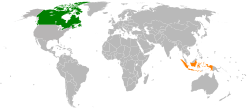Development assistance
Canada began to support economic development in Indonesia through the Colombo Plan during the 1950s. [3] For thirty years between 1967 and 2007, Canada provided aid to Indonesia within the international coordination arrangements established under the Inter-Governmental Group on Indonesia and the Consultative Group on Indonesia. [3]
As a development partner, Canada works closely with Indonesia to support sustainable economic growth and reduce vulnerability to poverty. The Canadian International Development Agency (CIDA) managed Canada's bilateral program for development assistance to Indonesia until it was folded into Global Affairs Canada. CIDA made Indonesia a major "country of concentration" for Canadian development cooperation, with Indonesia ranked as high as second place among Canadian aid recipients in the 1980s. [5]
Trade
Canada and Indonesia enjoy strong trade relations. Indonesia is one of Canada’s largest merchandise trading partner with total two-way merchandise trade of $5.1 billion in 2023. Canada’s exports to Indonesia were worth $2.3 billion and Canada’s imports to Indonesia were worth $2.8 billion. Exports and imports of products in this trade include manufactured goods, agricultural products, and natural resources. [6]
Canada also has significant investment interests in Indonesia, with Canadian direct investment valued at $6.7 billion in 2023, making it the second largest destination for known Canadian direct investment in the region. The major sector both by number of projects and investment value is the mining industry. The largest number of Canadian investment projects are on the island of Java, but the largest dollar value of investment is located in Sulawesi. [7]
On 24 September 2025, Canadian Prime Minister Mark Carney and Indonesian President Prabowo Subianto signed the Canada-Indonesia Comprehensive Economic Partnership Agreement (CEPA) which aims to remove or lessen tariff and non-tariff trade and investment barriers, make trade and investment more transparent and predictable, and provide new opportunities for Canadian industries and workers in industries like financial services, infrastructure, clean technology, agri-food, and critical minerals. [8]
This page is based on this
Wikipedia article Text is available under the
CC BY-SA 4.0 license; additional terms may apply.
Images, videos and audio are available under their respective licenses.



